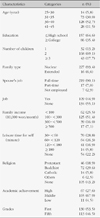Abstract
Purpose
The purpose of this study was to identify factors influencing life satisfaction for mothers with children in elementary school.
Methods
Participants were 243 mothers with a child in first and fifth degree of one elementary school in G city. Data were collected from March 20 to April 9, 2010. The instruments used were Satisfaction with Life Scale, Parent Satisfaction Scale, Korean ADHD Rating Scale, Parenting Alliance Inventory and Scale for Measuring Family Strengths. The data were analyzed using SPSS/WIN 14.0 computer program and included one-way ANOVA, Scheffe back-testing, Pearson's correlation coefficients and stepwise multiple regression.
Results
The life satisfaction of the mothers showed significantly positive correlations with parent role satisfaction, spousal support, and family strengths and negative correlations with ADHD. Significant predictors of life satisfaction for mothers with children in elementary school were spousal support and sharing of value systems, and these variables explained 37.0% of the variance in life satisfaction.
References
1. Abidin PR. Parenting alliance inventory. Charlottesville: University of Virginia;1988. Unpublished scale.
2. Burke RJ, Weir T. Husband-wife helping relationships as moderators of experienced stress: The "mental hygiene" function in marriage. In : Mccubbin HI, Cauble AE, Patterson JM, editors. Family stress, coping, and social support. Springfield, IL: Charlies C. Thomas;1982. p. 221–238.
3. Choi JH. Marital satisfaction and family strengths in dual-income teachers. J Korean Home Econ Educ Assoc. 2006; 18(3):163–173.
4. Chung MS. Age differences in satisfaction with life. Korean J Dev Psychol. 2005; 18(4):87–108.
5. Cutrona CE. Social support as a determinant of marital quality: The interplay of negative and supportive behavior. In : Pierce GR, Sarason BR, Sarason IG, editors. The handbook of social support and the family. New York: Plenum Press;1996. p. 173–194.
6. Diener E, Emmons R, Larsen R, Griffin S. The satisfaction with life scale. J Pers Assess. 1985; 49:71–75.

7. Duke HD, Rose HA, Halverson CF. Predictors of parenting satisfaction. In : 58th NCFR conference; Kansas City: Missouri. 1997.
8. DuPaul GJ. Parents and teacher rating of ADHD symptoms: Psychometric properties in a community-based sample. J Clin Child Psychol. 1991; 20:245–253.

9. Eo EJ, Yoo YJ. A study on the development of the scale for measuring family strengths. J Korean Home Manage Assoc. 1995; 13(1):145–156.
10. Guidubaldi J, Cleminshaw HK. Development and validation of the Cleminshaw-Guidubaldi Parent Satisfaction Scale. In : Fine MJ, editor. The second handbook on parent education. New York: Academic Press;1989.
11. Hong SH. A study on the level of family leisure participation and the level of life satisfaction of housewives. J Korean Home Econ Assoc. 1996; 34(2):71–84.
12. Jho MY. A study on the correlation between depression and quality of life in women. Seoul: Ewha Womans University;2000. Unpublished master's thesis.
13. Jung MS, Kim YS. Factors affecting parenting stress in mothers of school-aged children. In : Annual Meeting of the Korean Psychological Association; Seoul. 2008.
14. Kim GH. The effects of employed and unemployed mother's parenting efficacy and parental role satisfaction on life-satisfaction. J Korean Home Econ Assoc. 2011; 49(5):49–57.

15. Kim HS, Kim KS. Parental role conflict and psychological well-being of dual-earner couples. J Korean Home Manage Assoc. 2003; 21(4):117–131.
16. Kim HS, Park GR. A study on the relations between ADHD of children and family strengths. J Kyungpook Nurs Sci. 2010; 14(1):97–113.
17. Kim HY. The difference in evaluation between teachers and parents on ADHD inclined children using K-ARS measures. Seoul: Sookmyung Women's University;2008. Unpublished master's thesis.
18. Kim IJ. Motherhood ideology and parent satisfaction among mothers with pre-school children. Seoul: Yonsei University;2005. Unpublished master's thesis.
19. Kim JY, Min HY. The effects of adult attachment and satisfaction with life on affection-rejection parenting in preschoolers' mothers. J Korean Child Care Educ. 2010; 6(1):137–155.
20. Kim MS, Sung EH, Kim HW. Five factors of personality and subjective well-being among married women. Korean J Psychol. 1999; 4:41–55.
21. Lange G, Sheerin D, Carr A, Dooley B, Barton V, Marshall D, et al. Family factors associated with attention deficit hyperactivity disorder and emotional disorders in children. J Fam Ther. 2005; 27:76–96.

22. Lee IS. Depression and husband's support in married women. J Korean Acad Women Health Nurs. 2002; 8:482–493.

23. Lee MA. A study on the effects of family resilience on the life satisfaction of the families of the patients with schizophrenia. Daejeon: Chungnam National University;2005. Unpublished master's thesis.
24. Lim KA. The relations of emotional expressiveness and spousal support with role satisfaction among men in transition to parenthood. Seoul: Yonsei University;2004. Unpublished master's thesis.
25. McLaughlim DP, Harrison CA. Parenting practice of mothers of children with ADHD: The role of maternal and child factors. Child Adolesc Psychiatry Ment Health. 2006; 11:82–88.
26. Nam HA, Yang S. Parenting stress and parenting role stress in parents of primary school students. J Korean Acad Psychiatr Ment Health Nurs. 2005; 14:323–334.
27. Oh EK. A research how parenting behavior by the working mothers, support of spouse and the degree of professional satisfaction affect the parenting stress. Daejeon: Mokwon University;2001. Unpublished master's thesis.
28. Park HS, Kwon BS. Satisfaction with life and it's predictors of college students. J Korean Acad Psychiatr Ment Health Nurs. 2006; 15:48–56.
29. So YK, Noh JS, Kim YS, Ko SG, Koh YJ. The reliability and validity of Korean parent and teacher ADHD rating scale. J Korean Neuropsychiatr Assoc. 2002; 41:283–289.
30. Yang MS, Han YS. The influence of child's perception of family strengthens and parental childbearing attitude on behavior problems in adolescent transition. Korean J Couns. 2007; 8:351–363.




 PDF
PDF ePub
ePub Citation
Citation Print
Print







 XML Download
XML Download